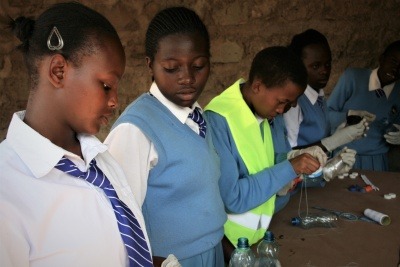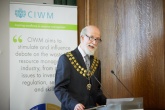WasteAid community recycling project in Kenya receives UK Aid funding
Recycling charity WasteAid is set to establish a new recycling centre in Kenya after being awarded a grant from UK Aid Direct, the government fund for civil society organisations working towards poverty reduction.
WasteAid was set up by UK waste professionals to spread replicable and scalable recycling skills to developing countries, and drew acclaim for its ‘Making Waste Work’ toolkit in 2017, which was recognised as one of the top three publications of the year by the International Solid Waste Association. The charity seeks to highlight the waste crisis in developing countries, with two billion people in the world not having their waste collected and three billion not having access to a decent waste disposal site.

Kwa-Muhia has no formal sanitation or waste management provision, contributing to pollution in Lake Naivasha, which has conservation status, through plastic pollution and agricultural runoff from nearby flower farms producing cut flowers for UK supermarkets.
The recycling centre will collect waste and turn it into useful products that can be sold to generate an income. WasteAid will be working with the Kwa-Muhia Environmental Group (KMEG), a community group in the informal settlement with an extensive network of stakeholders and supporters.
Commenting on the project, Duncan Oloo, KMEG project manager, said: “Waste is a serious problem in Kenya. Thanks to the funding from UK Aid Direct, and support from WasteAid, the Kwa-Muhia Environmental Group will be able to clean up our informal settlement and convert waste into wealth.

“This UK Aid-funded project will also stop waste from Kwa-Muhia polluting Lake Naivasha, which is an internationally important wetland site. Overall, the project is good for people, good for the environment, and makes good economic sense too.”
The funding for the project will run until the end of 2020. WasteAid’s project manager Jill Matthews is currently in Kenya working with KMEG to gather baseline data and prepare a site for the new recycling centre, with the local team organising a waste collection service for a range of materials and their processing. KMEG will also be running an awareness raising campaign to encourage waste-wise behaviour in Kwa-Muhia.
Matthews said: "We are really excited to be bringing UK Aid support to the shores of Lake Naivasha. A simple waste management service can have a significant positive impact on people’s lives. We will be working with our partners KMEG to introduce simple and affordable waste management and recycling skills, creating jobs and cleaning the environment for current and future generations.
“We hope to develop a low-cost model for other settlements in Kenya and elsewhere to follow. We will be posting regular updates demonstrating how we are turning waste into wealth, using simple and affordable techniques.”
The project in Kwa-Muhia represents the latest WasteAid initiative to receive direct funding from DFID after receiving a grant from the UK Aid Small Charities Challenge Fund for a two-year plastic recycling project in The Gambia last November.
The UK Government has signalled its intention to increase support for waste management in developing countries in light of the marine plastic crisis, pledging £61.4 million to tackle marine plastic pollution through the new Commonwealth Clean Oceans Alliance (CCOA). A significant part of the government’s Resources and Waste Strategy was also dedicated to how the UK can support developing countries to improve their waste management systems.
You can find out more about WasteAid on the charity’s website.









